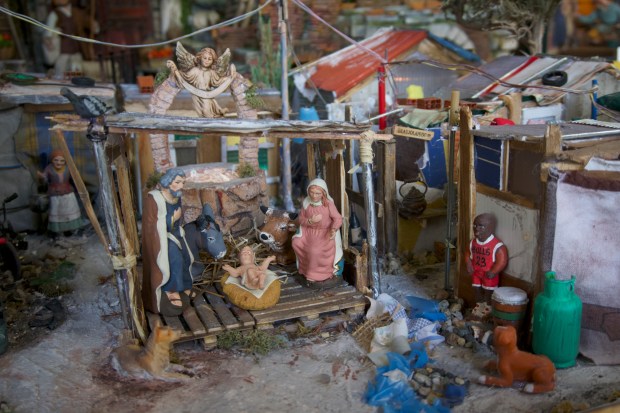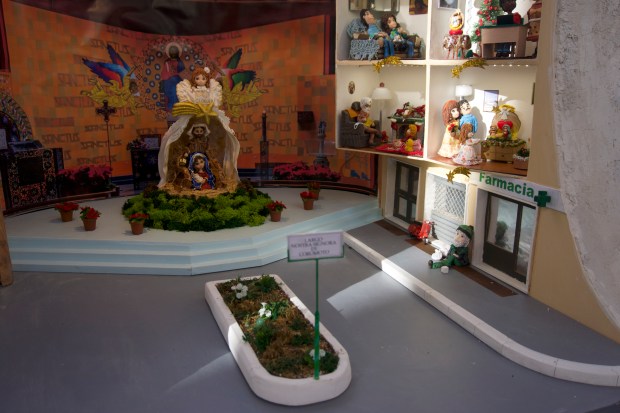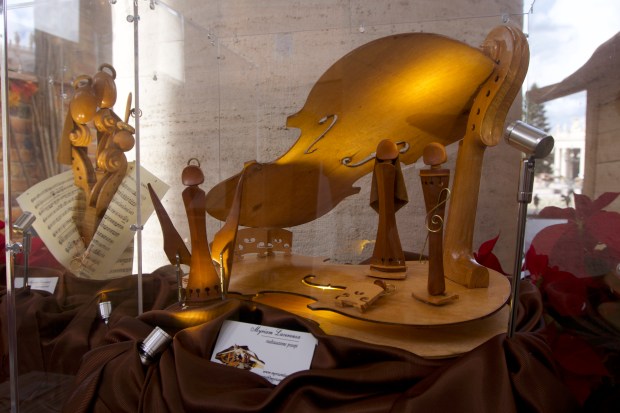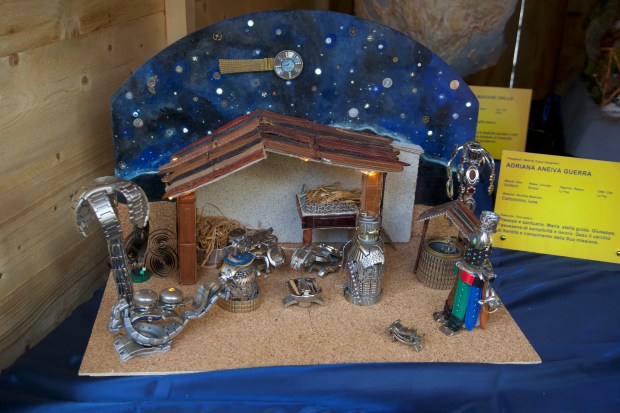Lenten Campaign 2025
This content is free of charge, as are all our articles.
Support us with a donation that is tax-deductible and enable us to continue to reach millions of readers.
As Christmas approaches in Rome, St. Peter's Square is adorned with nativity scenes. In addition to the large scene placed next to the great obelisk, 126 scenes from around the world are on display under Bernini's colonnades for the fourth year of the "100 Cribs in the Vatican" exhibition.

1. The fragrant nativity scene (photo Antoine Mekary)
As you walk through the exhibition space you'll recognize the unmistakable sweet scent of chocolate, even before this nativity scene comes into view. This representation is in fact made entirely out of dark chocolate, from the oldest factory in Rome, located in the Abbey of Our Lady of the Blessed Sacrament. This Abbey has been producing the “Chocolate of the Trappists” with the same recipe since 1884. The crib was made by sculptress Germana Conti D’Anna.
2. When the Holy Family takes the bus (photo Antoine Mekary)
Even the busy traffic of the Eternal City found its place in the Vatican’s exhibit. Mary, Joseph and Jesus can be found sitting inside a bus from Rome’s public transport company, ATAC. The bus, which served the Italian capital’s streets in the 1980s, is accompanied by a “64 St. Peter’s Square” stop sign: not a bad place to be born! This creative scene was made by Daniele Monni.
3. A well protected holy family (photo Isabella H. de Carvalho)
This tranquil crib is nestled within a large red fire extinguisher… The Firefighters of the Vatican City State could not find a better location for the birthplace of baby Jesus, than in one of the tools they use to save lives! Maybe it is to represent that the Son of God came in fact to save humanity.

4. A knitted crib (photo Antoine Mekary)
This white nativity scene, entirely knitted by hand, shows Mary, Joseph and Jesus in front of the Cathedral of Santa Maria Assunta, the main church in the city of Fermo in central Italy. This is in fact the hometown of the author of the piece, Annalisa Paniccia. She submitted her crocheted work almost “as a joke,” local media reported. However, the organizers of the Vatican exhibit were struck by her detailed work.
5. A light in the middle of the slums (photo Isabella H. de Carvalho)
The Holy Family stands amongst trash, gas canisters, and ramshackle barracks. Antonio Mariella’s nativity scene wants to show the arrival of Jesus as a light of hope and dignity for the forgotten migrants who live in the Borgo Mezzanone slums, in the Apulia region in the South of Italy. These slums host the migrant workers who labor in the nearby fields.

6. The crib within the crib (photo Antoine Mekary)
This sculpture is a crib within a crib as it shows the Italian painter Gentile da Fabriano creating his famous “Adoration of the Magi" painting, showing the three wise men visiting Jesus. Today this artwork dating from 1423 is housed in the Uffizi Gallery Florence. This crib is made by Anna Maria Simeone.
7. Time for a coffee! (photo Antoine Mekary)
When Pope Francis and St. Francis of Assisi meet for a coffee and the birth of baby Jesus… This nativity scene is based on the “Christmas of Greccio” a fresco painted by the Italian painter Giotto in the Basilica of Saint Francis in Assisi. The fresco depicts Christmas Day, 1223, when St. Francis allegedly set up a live nativity scene in the city of Greccio and baby Jesus then appeared during the mass.
8. A nativity scene dedicated to a beggar (photos by Antoine Mekary and Isabella H. de Carvalho)
“The Church is us,” the description card of the nativity scene of the Parish of Our Lady of Coromoto says. The faithful of this parish in Rome created a crib representing their own church, including with the square, pharmacy and street sign that can be found outside the real building. Present in the scene is also Evasio, "professional beggar of God's mercy,” to whom the crib is dedicated.

9. The springs within the crib (photo Antoine Mekary)
A dynamic nativity scene was made by a second grade class from a school in the Italian city of Pofi. Minimalist but original it is made of springs, a flame spreader and other kitchen metal bits and bobs. It is placed amongst other little cribs created by school children.
10. The collector of nativity scenes (photos by Antoine Mekary)
Walking through the exhibit you will notice Stefano Rappuoli’s name pop up several times in the description cards. This Italian man is very passionate about nativity scenes and has been collecting them from all over the world for over 30 years. He likes to observe how the Holy Family can be represented in different cultures: these ones are from the USA and from Colombia!
11. Baby Jesus in Hungarian dress (photo Antoine Mekary)
The Foundation for Hungarian craftsmanship, in collaboration with the Hungarian Embassy to the Holy See, created several nativity scenes in the exhibit. For example this one made by Itván Kiss, out of lime tree wood, shows the Holy Family in traditional Hungarian clothes.
12. When the donkey is replaced by a panda (photo Antoine Mekary)
This scenic crib by the Bishops’ Conference of Taiwan transports us to eastern Asia, as local animals replace the traditional donkey and ox. Amidst a clear brook and grass dotted with red flowers, a panda, monkey, tiger and parrot can be seen welcoming the new baby.
13. A nativity scene for the pandemic (photo Antoine Mekary)
Even the pandemic finds its way into the Vatican’s crib exhibit… Barbara Forgione made a sticker nativity scene which she placed over a protective COVID-19 shield. Decorated with white and gold fabrics and adorned with the phrases “Let there be peace on Earth” and “You come down from the stars” (Tu scendi dalle stelle), this scene recalls that even in the darkest of times light can shine through.
14. A violin for the Gloria (photo Isabella H. de Carvalho)
The Holy Family inside a violin… This original idea is brought to life by artist Myriam Lacerenza. She placed the modern figurines of Joseph, Mary and the archangel Gabriel under a violin shaped wooden roof. Joseph holds a musical note shaped shepherd’s crook made out of wire.

15. Christmas time (photo Isabella H. de Carvalho)
This crib made by Antonio Balzarini is one of the more conceptual installations in the exhibit. Inspired by the theme of time, it is made entirely out of materials from clocks. It is supposed to evoke the concept that the birth of Jesus lies outside of time itself as we know it. The coldness of the metal materials contrasts with the warmth of the tender scene depicted.





















